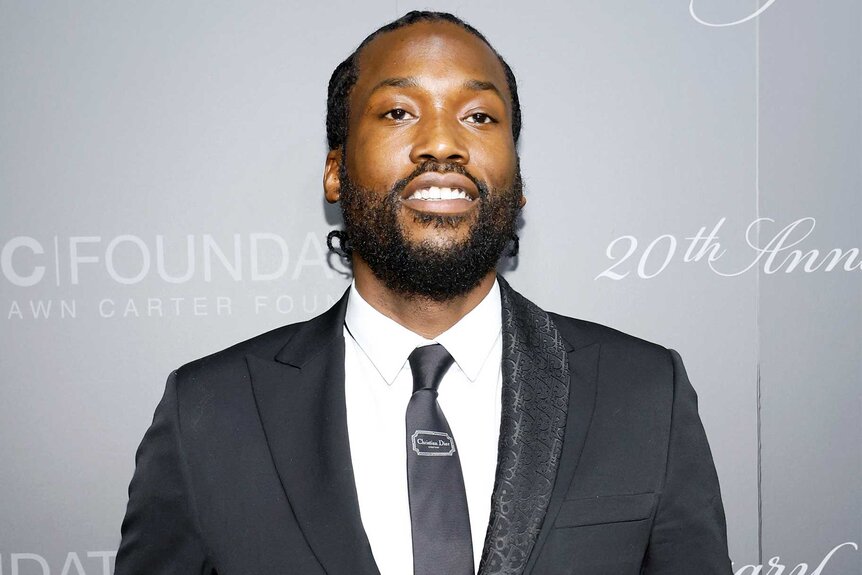Create a free profile to get unlimited access to exclusive videos, breaking news, sweepstakes, and more!
Why Rapper Meek Mill's Fight for Criminal Justice Reform Is So Personal
“I feel like God put me in the position to be the voice for the voiceless,” rapper Meek Mill told Dateline: Secrets Uncovered of his fight for criminal justice reform.
Rapper Meek Mill is known for his hip-hop beats, but the Philadelphia native is also using his voice for criminal justice reform.
After his own experience being sent back to prison for a technical probation violation, Mill — whose real name is Robert Rihmeek Williams — has set out to shine a light on what he sees as an unjust system that keeps minorities “trapped forever” within the criminal justice system through overly restrictive probation policies that send some to prison for years for minor violations.
“I feel like God put me in the position to be the voice for the voiceless,” Mill told Dateline: Secrets Uncovered.
In December of 2023, Mill was on hand as Pennsylvania Gov. Josh Shapiro signed a probation reform bill into law that changes how his home state handles those in the probation system in what he viewed as a positive step forward in the reform movement.
“We try to be better, but they labeled us ‘felons,’ sent us back to jail,” an emotional Mill told the crowd, according to The Hill. “I had to fight against that the whole time to gain my respect and be who I am today.”
What was Rapper Meek Mill arrested for?
Mill grew up in the rough inner city of Philadelphia, where drugs, guns, and violence were a prevalent part of the streets. His father was shot to death when Mill was just 5 years old.
“Every area we lived in there was always like, violence, shooting,” his mom, Kathy Williams, told Dateline’s Lester Holt.
Mill found a refuge in music, rapping on local street corners and clubs before gaining the attention of hip-hop mogul Jay Z, who ultimately signed him to his management company Roc Nation.
But on Jan. 24, 2007, Mill, then 19 years old, found himself in trouble with the law after he was arrested outside his cousin’s house. Police from Philadelphia’s narcotics unit took him into custody after an officer claimed they had seen him sell drugs the day before — a claim Mill has always denied.
For more from Dateline:
Who Killed A Former French Model Discovered Dead In Her Backyard Pool?
The Shocking Real-Life Story Behind Denise Huskins' Brazen Kidnapping
Charles Manson Follower Recounts Life With Infamous Cult Leader: "He Really Got Mean"
Mill, who was carrying a gun in his waistband, recounted his version of events to Dateline: Secrets Uncovered.
“I ducked behind a car, and I put the firearm on the ground … And they ran up on me and tackled me to the ground. And, like, knees on my head, put the cuffs on me behind my back, and barged me through the front door. They barged me through the front door, like, with my head, basically,” he said of the alleged police violence. “When I came in, it was brutal. It got brutal. There was blood everywhere. I got knocked out about three or four times.”
Reggie Graham, an officer at the scene, would later claim Mill pointed a gun at him. He was charged with 19 counts including assault, gun charges, and drug possession.
Graham was the only witness to testify at Mill’s one-day bench trial in front of Judge Genece Brinkley. Mill also took the stand and although he admitted to having the firearm, he denied pointing it at anyone or selling drugs.
He was convicted of six of the charges against him. Prosecutors recommended he serve five to 10 years behind bars, but Brinkley handed down a lighter sentence of 11 to 23 months behind bars. After less than six months, she ordered Mill’s release and he was placed on eight years of probation.
“The problem with the sentence wasn’t the jail sentence that was imposed, it was the enormous amount of probation that was placed on top of it,” defense attorney Brian McMonagle contended.
What was the #FreeMeekMill movement about?
Under the terms of his probation, Mill would have to be subject to random drug tests and have his travel schedule approved by the court.
Any technical violation of his probation — which could include anything from being late for a probation meeting, traveling outside the jurisdiction without permission, or being late for a curfew — could send him back to prison.
In the years that would follow, Meek received technical violations after testing positive for opioid use, providing a fake urine sample, and traveling without permission.
In 2017, Brinkley sentenced him to two-to-four years behind bars for violating his probation after he was arrested for being involved in a fight and popping wheelies on a motorcycle in New York City, although no charges were ever filed in either case.
Mill soon earned the support of a powerful group of allies including celebrities like Kevin Hart and billionaire Michael Rubin, a co-owner of the Philadelphia 76ers, who fought to get the rapper released. The #FreeMeekMill movement launched from there.
An investigator hired by Rubin’s team also looked into his original conviction and found evidence to challenge Graham’s credibility, according to Dateline: Secrets Uncovered, including one former coworker who alleged Graham was a “dirty” cop, a claim Graham himself has denied.
When was Meek Mill released from prison?
Mill was released on bail on April 24, 2018 midway into his sentence after the Pennsylvania Supreme Court ruled he should be allowed out on bail.
“It felt like a dream come true,” Mill would later tell Holt.
While Mill’s case got national attention, he was quick to point out that many others in the system were not so lucky.
“This is the same thing that thousands of other minorities are going through on a daily basis, they just don’t have the platform to have anybody speak on their behalf,” he said, vowing to become that voice for others.
What is Meek Mill doing today?
Today, Mill continues to advocate for criminal justice reform. He co-founded the non-profit organization, REFORM Alliance, to advocate for parole, probation, and sentencing reform.
In 2019, he was granted a new trial for his original conviction but rather than re-try the case, the district attorney’s office offered him a deal and Mill pleaded guilty to a misdemeanor gun violation.
Gov. Tom Wolf granted him a full pardon in 2023, permanently removing the conviction from his record, before he left office.
That same year, Mill watched as new Governor Josh Shapiro signed the new probation reform bill into law. Under the new law, mandatory probation reviews are required for those serving misdemeanor and felony sentences and clarifies that those who have minor technical violations should not be sent back to prison, according to The Hill. Only those who commit “serious” violations could face new prison time.
“We all learned from Meek’s case because it shined a light on the injustices in our probation system,” Shapiro said.




































